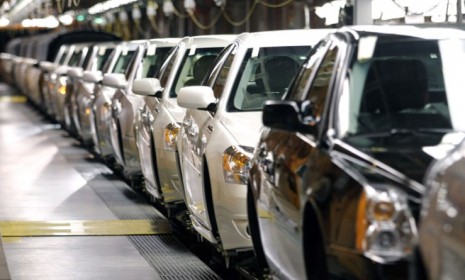Chevy Volts' potentially flammable batteries: Are the cars still safe?
GM's green-energy star hits a speed bump — with some Volts catching fire weeks after being damaged in government crash tests

A free daily email with the biggest news stories of the day – and the best features from TheWeek.com
You are now subscribed
Your newsletter sign-up was successful
General Motors' new electric car, the Chevy Volt, has won top customer satisfaction ratings, but it's getting plenty of demerits from the federal government. Days or weeks after the government conducted side-impact tests on Volts, the cars' lithium-ion batteries caught fire, and the government is investigating why. (The same type of battery has been blamed in the past for flaming, over-heated laptops.) Anxious to defend the car's reputation, GM is saying the cause of the fires is still unknown. Still, the automaker is taking the unprecedented step of offering to buy back the vehicles from any owners worried the cars are unsafe. Do the Volt's batteries make it dangerous?
The safety concerns are undeniable: "Fortunately for Government Motors, fires in the Chevy Volt haven't killed anyone," says Henry Payne at National Review. But with vehicles erupting in flames after crashes, it's pretty obvious that "carrying around massive, 16 kWh lithium batteries" can be risky. Engineers should be able to identify what went wrong and fix it, "but the reputation of Washington’s preferred green vehicles may not be repaired so easily."
The Week
Escape your echo chamber. Get the facts behind the news, plus analysis from multiple perspectives.

Sign up for The Week's Free Newsletters
From our morning news briefing to a weekly Good News Newsletter, get the best of The Week delivered directly to your inbox.
From our morning news briefing to a weekly Good News Newsletter, get the best of The Week delivered directly to your inbox.
But there's no need for immediate alarm: Let's put this in perspective, says Heather Clancy at ZDNet. Are batteries that might ignite a week or more after a crash really more dangerous than a tank of gas that can explode on impact? And let's treat these test results with at least mild skepticism. GM "has developed a feature to depower batteries after crashes, a procedure that apparently was not followed" in the government tests. Still, let's hope automakers continue to keep "safety considerations close to heart."
"Chevy Volt fires have some asking: Are electric vehicle batteries safe?"
Volt owners feel safe, apparently: It is telling that the cars' biggest defenders are their owners, says Sebastian Blanco at Autoblog. The Chevy Volt Owners Facebook group has released a letter saying its members "are not giving up the keys." They "feel safe in their cars, love the powertrain technology, and trust GM and the governmental agencies tasked with making sure the car is as safe as it can be."
"Chevy Volt Facebook group: We love our safe cars"
A free daily email with the biggest news stories of the day – and the best features from TheWeek.com
-
 Is Andrew’s arrest the end for the monarchy?
Is Andrew’s arrest the end for the monarchy?Today's Big Question The King has distanced the Royal Family from his disgraced brother but a ‘fit of revolutionary disgust’ could still wipe them out
-
 Quiz of The Week: 14 – 20 February
Quiz of The Week: 14 – 20 FebruaryQuiz Have you been paying attention to The Week’s news?
-
 The Week Unwrapped: Do the Freemasons have too much sway in the police force?
The Week Unwrapped: Do the Freemasons have too much sway in the police force?Podcast Plus, what does the growing popularity of prediction markets mean for the future? And why are UK film and TV workers struggling?